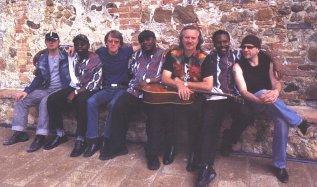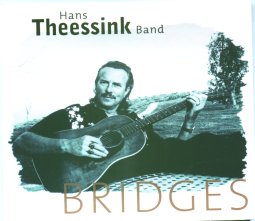|
Dutch musician and performer Hans Theessink (pronounced
Tay-sink) dedicated himself, body and soul, to American blues
and roots music? Hank has become one of the most sought-after
artists of the international blues scene. Constantly "on
tour" he is a modern day troubadour spellbinding audiences
all around the world with his rich and emotional sounds.
In the 60's a love of the Blues took hold of the man whom
Bo Diddley described as "one helluva guitar player",
and it has not let him go since. I took the opportunity to talk
to Hans about his career and asked him about this high praise
that Bo Diddley had heaped on him.
HT: I did quite a few tours with Bo in Europe and USA in
the 80's. He was fun to be around - always very inventive. Bo
has a great personal style of playing - in a way quite simple
but very effective. He tunes in open E (heavy- heavy strings)
and uses the capo if he needs another key. I would usually do
a solo opening set and then join him and the band for some numbers.
That's when he introduced me as "One helluva guitar player".
Actually Bo's first instrument was the violin - he was taught
by a  Hungarian
teacher. On one of the tours I gave him a fiddle and it was
amazing to see Bo Diddley play a rhapsody! Whenever we meet
these days, he still talks about that fiddle that he still picks
up every now and then. Hungarian
teacher. On one of the tours I gave him a fiddle and it was
amazing to see Bo Diddley play a rhapsody! Whenever we meet
these days, he still talks about that fiddle that he still picks
up every now and then.
Tell me what drew you to blues music and who were your
early influences in the music.
HT: I was into guitars already - more the folky stuff.
When I heard Big Bill Broonzy for the first time on late night
radio back home in Holland, I was sold on the spot. To me that
was a "chicken skin" experience and I was blown away
by the emotional impact of one voice - one guitar. It wasn't
easy to learn that acoustic blues style back in the 60's (or any
style for that matter - no teachers, books or videos like today)
so my first blues concert really was a revelation for me - when
I saw Brownie McGhee play. I got into the blues as a folkie and
my main influences were the folk blues people. I'd say Leadbelly
was a big influence too.
What started you playing professionally as a full time
musician?
HT: I had never really thought of music as a career but at
some point people paid me a few guilders to come and play some
songs - that sort of started it off. In the beginning it wasn't
easy to make a living but now I'm happy that my hobby turned
into a job. I couldn't think of a better way to make a living
What type of venues are you mostly working in now?
HT: Wherever people will book me. Anything from small
intimate clubs to big halls and huge festival stages. I do enjoy
the intimate places but it's also a ball playing on big stages
with huge sound systems.
You've played at a host of American jazz and folk
festivals, have you played any of the British festivals,
particularly our prestigious Cambridge Folk festival.
HT: I've played loads of UK festivals over the years -
also did Cambridge a few times. When Ken Woolard was running the
festival he booked me but I haven't played Cambridge lately.
Would like to do it again some time though. I'm off to Australia
and New Zealand for most of the rest of 2004 and my first
festival in the UK will be Celtic Connections in Glasgow end of
January. I think I've been booked at Trowbridge too next summer.
You have just release a new album…isn't this your 12th
album release? It's called Bridges…why that choice of title.
HT: If I count right it's number 18. Bridges is a pretty
symbolic title and whatever people want to put into it is fine
with me. One song on the album is called Bridges. I was thinking
of the collaboration in my band between people from such different
places as Europe and Africa. Also I was thinking of bridges
that got destroyed during the wars in ex-Yugoslavia and that
need the be rebuild. War-makers will always try to destroy bridges
and ways to connect. "What will the children play"
is a song on the album that deals with that war syndrome. Also
I think it's important for people to "cross bridges"
to see what's happening "on the other side"
Let's talk about the new album…all but two songs have been
written by yourself. Did you write those songs particularly
for the album?
HT: Some of the songs I had had laying around for a while
but most of the songs I wrote specifically for the Bridges
project and with the singers from Zimbabwe and their vocal
possibilities in mind.
 What
was the deciding factor in choosing the other two songs…Curtis
Mayfield's "People Get Ready" and Solomon Linda's
"Mbube" What
was the deciding factor in choosing the other two songs…Curtis
Mayfield's "People Get Ready" and Solomon Linda's
"Mbube"
HT: "People Get Ready" is a long time favourite
of mine and I thought that this band line-up would do the song
justice. Solomon Linda's "Mbube" aka. "The Lion
Sleeps Tonight" is a song that Insingizi (the singers from
Zimbabwe) brought in - "Mbube" was the first song
in that specific singing style that they took to and have become
masters of. Also after all the copyright discussion about the
song I thought it would be nice to actually mention the person
that wrote it. Of all the millions of dollars that that song
made Solomon Linda or his estate never saw a cent.
I get the feeling that some of the songs lean a little on
the inspirational side. Was this a conscience decision or is it
just a case of some of the songs fell that side of the fence.
HT: It wasn't really a conscious decision - just happened
that way. I went through a period with personal losses which
reflects in a song like "Circles" (I personally think
that song came out really well) so maybe my general mood was
more on the inspirational side when I wrote most of the songs.
The album was recorded in an old church in Tuscany. Can
you tell us more about this………why you chose this kind of
venue to record in.
HT: Friends of mine own the church at Monte Antico and
started a sort of artistic, cultural place in it. The church is
used by painters, sculptors, poets and musicians alike. On my
first visit I noticed the fantastic natural acoustics in this
old building and the idea was born to record there one day -
just the natural sound without digital reverbs and bits 'n
bytes. That's what we did: we had to bring all the equipment in
- we used loads of microphones (sponsored by RODE) to record the
music in the natural rooms. When I listen to the CD (actually
hybrid a SACD =Super Audio CD) I can sort of sense the beautiful
old building. Of course the place was also quite an inspiring
environment. The band sort of lived and recorded together for 10
days.

Tell me a little about the guys that play in you band…….I
presume that you carry a regular band as you're averaging around
200 concerts a year.
HT: I do play lots of solo gigs too. The album before
Bridges was "Songs From The Southland" (2003) which is
more or less a solo album. Most of my UK tours are solo.
Sometimes I have projects with other people - I do a duo
sometimes with Dobro and lapsteel player Cindy Cashdollar
(Asleep at the wheel a.o.); lots of slide there! and there's
also a trio in Denmark that I work with. My band at the moment
is the band that can be heard on "Bridges". Even
though I play a lot of blues I wasn't trying to put a blues band
together; I just found the people that I like to play with and
they all love to play. All the musicians are Austrian and they
all have a long pedigree in the Austrian rock-, jazz- and pop
scene. I need a "not too loud" drummer that can play
with brushes and a bass player that plays electric and upright
bass. The keyboard man is quite a wizard on piano and Hammond
organ and accordion too. The 3 African singers are also part of
the "Hans Theessink Band". At the moment we're working
on a DVD with a live show - hopefully that will be released by
the end of the year.
Thanks for your time Hans. I'm sure our readers are going
to look forward to seeing you performing in the UK in the New
Year.
HT: Celtic Connections in Glasgow is the first opportunity
to hear the band (that's end of January 2005). I think there
will be a few more things coming up for the band. I'll do a
longish solo tour again in October/November 2005.
Thanks Hans!!!
Check Hans' website: www.theessink.com
|


![]()